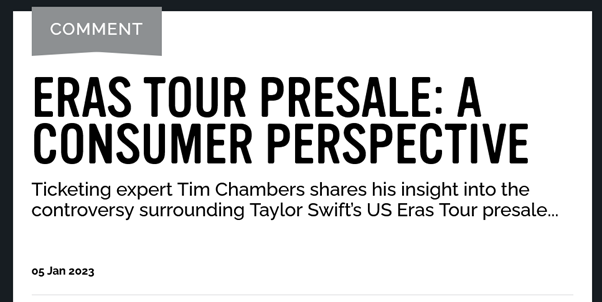To end the year, I was delighted to be asked by Gordon Mason (https://www.linkedin.com/in/gordonmasson/), Editor IQ Magazine (https://www.linkedin.com/company/iq-magazine/) to write a few words outlining a ‘consumer’ (or contrarian?) perspective on the recent Taylor Swift U.S. ‘Eras Tour’ presale, for the January 2023 Issue #116 (subscriptions via: https://www.iq-mag.net/subscribe/)
Obviously, this is an evolving story, and as the number of lawsuits and regulatory investigations continue, I should add the disclaimer that this is an Op-Ed (scribbled mid-December’22), and not meant to be a definitive overview of the causes or outcome(s) of the specific ticketing operations, pricing and retail distribution, nor a debate on the various antitrust and market competition issues.
Nevertheless, please comment via the usual channels.
Full article via IQ Magazine (https://www.iq-mag.net/).
***
TAYLOR SWIFT – A CONSUMER PERSPECTIVE
With more than 30 years’ experience within the international ticketing and live entertainment sectors, Tim Chambers is managing director of TJChambers Consultancy Ltd. Here, he shares his insight into the controversy surrounding Taylor Swift’s US Eras Tour presale…
The Taylor Swift US Eras Tour presale has proved to be a lightning-rod for consumer dissatisfaction over contemporary ticketing retail and distribution.
This has apparently come as a complete surprise to industry insiders who fail to understand [that] how the business currently operates is perhaps not as efficient as they presumed (at the very least in terms of individual ticket selection and purchasing, identity verification, queuing and/or payment processing technologies) and that the current ticket retail and distribution channels (designed to suit the economic relationships between artist, promoter/producer, venue, marketing partner, and affiliates i.e. incentives, rebates, shared-commissions and co-owned data), may not be entirely to the satisfaction of the end-user, the consumer. You know, the people who actually pay to attend the IRL spectacle.
Ticketing: B-2-B orientated not B-2-C
For too long, consumers frustratingly waited in physical queues outside venue box offices and/or physical outlets; then, with the development of retail contact centres, dialled into premium-rate hotlines; or more recently joined online virtual queues for the possibility of acquiring tickets at stated face-value-plus for their favourite artist at a cost, time, and location typically more convenient with the event rights owners.
To increase the likelihood of being successful in ticket purchase, consumers have increasingly opted to utilise various closed-user group facilities that appear to enable queue-jumping such as fan clubs, credit card memberships, venue loyalty schemes, or event co-promoter and/or sponsorship schemes. Albeit at some additional cost, in order to qualify for these supposedly ‘unique’ offerings.
For the more fiscally liquid consumer, there is also increasingly an array of yield-management designed, ‘exclusive’ ticketing including bundles (e.g., dynamically priced front-row seats, ticket + merchandise, artist meet & greet, ‘golden circle’ sections at festivals etc.) or packages (e.g., VIP & hospitality or ticket & travel/accommodation).
This bewildering array of oft-overlapping ticketing ‘offers’ is designed to raise competitive tension from competing event sponsors, advertisers, and ticket retailers, thus raising show grosses and/or service fees but can confuse and frustrate the consumer who appears to have more offerings but less actual choice.
Ticketing: A licence not a commodity
Following the usual law-of-unintended consequences, this (not) consumer-friendly attitude was one reason for the growth of unauthorised resale marketplaces, (where event rights owners claim the ticket is merely a restrictive licence and not a commodity) and the growth of ticket insurance schemes – where the consumer pays, again, to insure against the purchase they’re just made, with event rights owners receiving insurance commission kickbacks.
And so, following the ‘debacle’ of the Taylor Swift Eras Tour presale, when the Messina Group (AEG) successfully sold over 2M tickets (plus 400K via Capital One) in one day via Ticketmaster (Live Nation), the ticketing industry shrugs its collective shoulders and says, “Crisis? What crisis?”
Perhaps opportunistically, there has been a raft of US politicians who have denounced the alleged ‘anticompetitive’ and ‘fraudulent’ presale process. There have also been calls for the Department of Justice to revisit the 2010 Live Nation-Ticketmaster merger.
Lina Khan, chair of the Federal Trade Commission (FTC), has avoided directly commenting upon any potential review process but has offered the opinion that when, “firms become dominant, they become too big to care.” She further stated that typically for dominant operators, “There is a certain amount of investment in their services and their products that we don’t see because they’re not facing robust competition.”
Senators Richard Blumenthal and Marsha Blackburn have now asked Khan how the FTC plans to enforce the 2016 law known as the Better Online Ticket Sales (BOTS) Act, which was designed to crack down on the kind of illegal bots – claimed by Ticketmaster to be a key reason for their Eras system failure.
Jan Schakowsky and Gus Bilirakis of the House Energy and Commerce Committee have also written to Live Nation CEO Michael Rapino requesting that he clarify the ticketing process for the Eras tour and provide a list of actions the company will now take to ensure consumers will have better access to live entertainment in the future.
Lawsuits from Vigilante Legal, representing individual Taylor Swift fans, and another California lawsuit that alleges Ticketmaster violated the California Cartwright Act and the California Unfair Competition Law during its presale to “verified fans,” have also been served. This latest complaint seeks a civil fine of $2,500 per violation, alongside plaintiffs seeking the costs of attorneys’ fees and any additional relief the court deems.
So, the clamour to some remedial change in behaviour and/or market operations and increased sector competition is growing. And seemingly all initiated by a ‘failed’ presale of 2M+ ticket sales.
IQ Magazine, #116, Page 11 – January 2023


